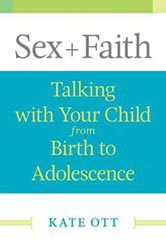 Kate Ott, a professor of Christian Social Ethics at Drew University, Theological School, knows that talking with your child about sex can be scary. Her new book, Sex + Faith, comes along to help. It aims to help parents incorporate their faith values with sexual information so they can answer questions, discuss sexuality at each stage of childhood, and show support of sexual differences. She answered some questions about how — and at what age — to begin this dialogue and how we as parents can get prepared by looking at our own values and assumptions.
Kate Ott, a professor of Christian Social Ethics at Drew University, Theological School, knows that talking with your child about sex can be scary. Her new book, Sex + Faith, comes along to help. It aims to help parents incorporate their faith values with sexual information so they can answer questions, discuss sexuality at each stage of childhood, and show support of sexual differences. She answered some questions about how — and at what age — to begin this dialogue and how we as parents can get prepared by looking at our own values and assumptions.
(For more conversation on Sex + Faith – and to read a book excerpt – visit the Patheos Book Club here.)
At what age do you believe parents should start the conversation about sexuality?
The question is not really when we should start a conversation about sexuality. Rather, we need to recognize how we are teaching about sexuality from birth. Sexuality is not just sexual behaviors or sexual orientation. It is about how we understand gender, relate to our bodies, experience touch, and build relationships. For example, when we talk about what being a girl or boy means, name our body parts, learn how to ask permission to hug a friend or tell someone we don’t want to be touched, these are some of the ways we talk about sexuality very early on with our children.
What is your response to parents that think their children are too young to be talking about sex?
In general, this reaction comes from very limited idea about what we mean by “sex” – usually sexual intercourse. There are definitely age appropriate times to provide more detailed information about sexual intercourse. We talk about sexuality related issues all the time, including gender, relationships, hygiene, and body image from a young age.
Many parents believe that “the talk” is a one-time discussion to be had during the teenage years, what is your opinion on this?
As many sexuality educators often remark, waiting until the teen age years usually means “the talk” is a history lesson. Most of our children learn about reproduction and puberty around 5th grade and probably they learn much more on the school bus or the playground prior to that. As a parent, I want my children to hear about sexuality issues from me so that I can answer questions and explain my faith values before they hear information from someone else or are shaped by the values they see on TV or hear from friends. Talking early and often about relationships, behaviors, and body changes open the door to deeper conversations as children grow up.
What question are you most frequently asked about sexuality and parenting?
Many parents express to me, “I just don’t know where to start.” They either grew up hearing nothing or having the talk. Parents often don’t have role models or even positive experiences to rely upon. I encourage parents to first recognize the many ways they have already been talking about sexuality when it comes to taking care of your body, being a good friend, maybe even sexual abuse prevention. Second, I encourage them to practice talking about sexuality issues such as when a TV character talks kisses someone or is in a dating relationship, maybe even pick out some song lyrics from the newest Top 10 hit. These are concrete examples, not too personal, and provide an opportunity to talk about family and faith values related to sexuality.
How do you respond to parents that believe talking about sexuality will lead to experimentation?
I point out three things: 1. Research consistently shows that the opposite is true. Kids with more information delay behaviors and often use safer sex practices than kids who have not been given accurate and age appropriate information. 2. If a parent doesn’t provide the information, who knows where a child will end up getting their information. And, I can almost guarantee the information won’t be based in your family and faith values. 3. There are few other topics where we hide information from children – violent events are probably the only other example I can name. This could send a message that sexuality is shameful, dangerous, or mysterious (increasing the desire to seek information elsewhere).
What is the most important piece of advice you could give to a parent just beginning the conversation with their child about sex?
Take advantage of what sexuality educators call “teachable moments.” These are periodic chances to share specific information that make sexuality discussions a routine part of parenting. This demystifies sexuality as a taboo topic and sends a message to your child that you are always open to their questions.
Should the adult start the conversation about sex, or wait until the child approaches with a question?
Optimally, we strive for a parenting relationship where our child feels free to ask anything and we are ready with age appropriate information and education at the exact right moments in their lives. Parenting is not about perfection. Often parents need to lay the foundation for conversations about sexuality issues so a child knows we are comfortable with such topics and we will answer their questions. As children grow older, they often become more private and even embarrassed about such discussion. There will be times when a parent might “schedule” a time to talk about specific information like recognizing and responding to sexual abuse, preparing for bodily changes, or expectations for a dating relationship.
What is the most difficult question that your children ask you?
Recently, the media coverage of the Penn State scandal was a focus of discussion in our house because my son likes to watch ESPN Sports Center. The issue was difficult to discuss not because of the sexuality content, but because we had to explain that not all grown-ups will keep you safe or protect other children. When we tell our children to tell a trusted adult immediately if they hear about or experience inappropriate sexual touch by an adult or older child, they expect adults to believe them. It was very challenging to name how often adults don’t believe children and allow others to continue to harm them.
What role does technology play in the discussion with children about sex?
Technology is incredibly multifaceted. I often break discussions of technology and sexuality into issues related to social media and the internet. I know they are connected, but this helps make the conversation manageable. With regard to social media, it is important to talk about what information we share and with whom. As part of that, I find a good rule to be: always ask a friend’s permission before sharing information that is about them or a picture they are in. This reinforces ownership of information and need for consent. Since lots of “friendships” and even dating relationships can begin via social media, it is also helpful to have conversations about how we communicate with each other (tone of language, level of intimacy, etc.).
When it comes to the internet, talking about safety and search practices is necessary. One way to do this is to bookmark specific safe sites for games, news, and even sexuality information. If a child is going to do an open search, walk them through how to look up information and how to make decisions about what sites and information can be trusted. As children get older, it is also an opportunity to talk about the legality of and your values toward pornography use and other sexual material.
As a parent, does talking with your children about sex ever get easier?
Yes and no. Talking about any issue that we find uncomfortable takes practice. Things get easier with practice. Once a parent has thought through their values it is also easier to keep coming back to those ideas as new issues arise. On the other hand, our children grow and change, society changes, and we face new and unexpected issues. I always try to remind myself that no matter how uncomfortable I feel, I want my children to have information accompanied by faith values that will make them and their relationships healthier, safer and more loving.












